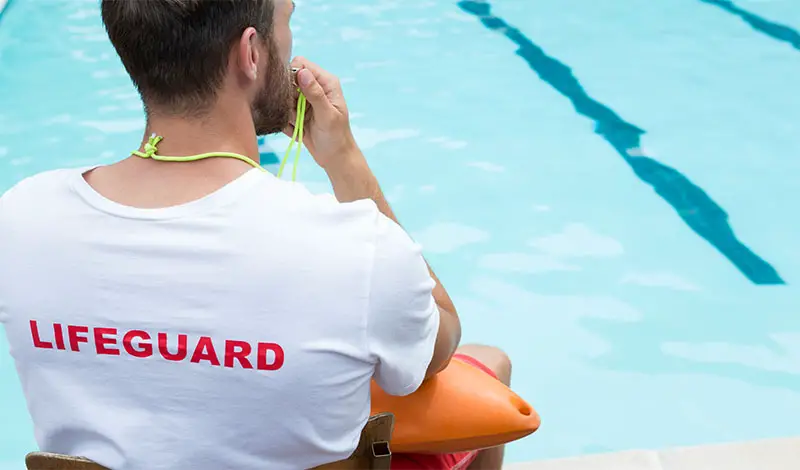Disadvantages of Swimming
When I think about swimming as a workout, my mind immediately goes to all the amazing benefits it has on my body. It’s light on my joints, but challenging enough to get my heart pumping. It’s a full-body workout that is inclusive of all ages and fitness levels. There are just so many great things about swimming.
What I rarely think about is the disadvantages of swimming. However, after having a full summer of swimming constantly with my family, I actually recently endured a negative side effect of swimming – swimmer’s ear. It was incredibly uncomfortable and even required treatment to fix. After about a week of discomfort, I finally recovered. This experience definitely got me thinking more about the disadvantages of swimming and what I need to do to prevent them. So, here are the 7 disadvantages of swimming that you need to know about…
1. Sun Exposure
If you’re swimming anywhere other than an indoor pool, you are increasing your risks of overexposing yourself in the sun. Sun exposure is a disadvantage of swimming that most people know about, but not to the extent that they should.
There are actually negative effects for both short-term and long-term sun exposure. Short-term can happen in as little as fifteen minutes of exposure, but won’t show up for a couple of hours. This is usually as mild to severe sunburns depending on the amount of exposure and your use of sunscreen. While these aren’t extreme disadvantages, having many sunburns and sun exposures over time can cause even worse consequences.
We can characterize long-term sun exposure as the former – having many short-term exposures. Long term can range from premature aging, wrinkles, and sun spots to skin cancer. They have actually found that if you have over five sunburns; you increase your risk of melanoma by 80 percent.
Of course, with many disadvantages, there are things you can do to decrease your risk of enduring the negative side effects of sun exposure, like wearing protective clothing and applying sunscreen as directed.
2. Common Injuries

Even though swimming is notorious for being a great workout that is easier on your joints, it still comes with some inherent risks of injury. As with any physical activity, if you over train with little rest and recovery, you will probably become injured.
Though it can be preventable with proper care, proper rest, and treatment, neck and shoulder injuries are among the most common for swimming. Some of these injuries include inflammation of the shoulders, rotator cuff tears, shoulder socket tears, bicep tendonitis, back pain, and more.
As you can see from the common injuries listed above, the majority involve your upper body. Even though it is a full-body workout, your arm and neck muscles are working a great deal with the more complicated movements and strokes. So, as you are swimming, it’s important to be mindful of these common injuries, stretch your upper body appropriately, and give yourself plenty of time to recover from your workouts.
3. Infections
You can get bacterial infections from the water depending on where you are swimming. Even if a pool is treated with chemicals, bacteria can still survive. The biggest example of a bacterial infection you can get from swimming is swimmer’s ear. This is where a small drop of pool water that has bacteria becomes trapped in your ear. If the bacteria is not removed, it can grow and develop into an incredibly uncomfortable ear infection.
As I shared above, I suffered from swimmer’s ear not too long ago, and it was not fun! While it’s one of the most common infections that is caused by swimming, it’s not the only one. Swimmers can also suffer from other infections, such as athlete’s foot, yeast infections, and eye infections that are caused by various reasons.
What’s most important to note from this disadvantage of swimming is to take care of your body and be aware of the water you’re swimming in. Even if it is treated properly, be sure to get all the water out of your ears.
4. Pool Chemical Complications
While they keep you safe and keep the water clean, pool chemicals (such as chlorine) can also cause some complications. Here are a few of the many…
-
Dry Skin
You might notice dry skin from being in the water alone, but it can also result from the chemicals that are in the water. More often than not, you may experience dry patches where your skin becomes irritated by the chemicals.
-
Frail Hair
If your skin isn’t sensitive to the chemicals, your hair may very well be. Another of the disadvantages of swimming to know about is that your hair may not react well. As you swim more often, you may notice your hair feeling dryer and more frail than usual.
-
Irritated Eyes
Especially for those who wear contacts, your eyes can become very irritated by the unnatural chemicals in the pool. You can experience a range from simply eye discomfort to redness, irritation, and even infections.
-
Allergic Reactions
Last, it’s important to note that some people may actually experience allergic reactions to chlorine. Well, not exactly an allergy as some may think, but more of an irritation if you already have allergies. So, if you are prone to allergies, the chemical can evoke a response and actually irritate your respiratory tract.
5. Dehydration

Weird, right? Can you really get dehydrated while you’re swimming? While it may not be the first disadvantage of swimming to come to mind, dehydration is actually a critical disadvantage that can really affect your well-being. If you’re anything like me, you may just assume that since you’re doing an activity IN water, that you won’t overheat or become dehydrated. That just isn’t the case. It’s this exact reason that you need to know that dehydration is an enormous risk when swimming.
Here are a couple of key factors to consider with dehydration in a pool setting…
-
Sweating
One big misconception people have about swimming is that they don’t think you sweat when you’re in the water. Sweating is our body’s natural way to cool down when we are hot or overheating. When you go for a run, it’s easy to notice that you’re sweating, so you’ll be more conscientious about taking sips of water to compensate for the water loss. With swimming, the sweating isn’t as obvious, so people may not think as much about taking sips of water here and there.
-
Pool Temperature
While the sweat factor can be the biggest contributor to becoming dehydrated while swimming, the speed at which you become dehydrated without proper water can also be affected by the temperature of the pool you’re swimming in. Again, the warmer your body gets, the more it will compensate by sweating to keep you cool. Thus, the more water you will lose and you’ll need to drink to regain. So, if you’re in a pool that is warmer in the heat of the summer, you’ve got to stay even more vigilant about drinking and staying hydrated. That’s why they keep most competition lap pools at 77-82 degrees Fahrenheit – so the swimmers don’t overheat.
-
Fuel
Eating and drinking adequately throughout your workout is the number one factor in preventing dehydration. So, if you’re aware of dehydration being a disadvantage of swimming to know about, you will fuel properly and not have to worry about becoming dehydrated!
6. Weight Gain
When I think about swimming, I think of it as this rockstar, amazing workout. I think of it as a full-body, intense workout that has nothing but great things to come from it. Most people exercise to become more fit. They set goals for themselves, like losing weight, getting stronger, or wanting to take part in a particular race or active activity. So, it may come as a surprise to many people that even though swimming is a wonderful way to get into shape, there are some instances where it could actually lead you to gain weight. Here are the main reasons…
-
Muscle Gain
You may have heard before… muscle weighs more than fat. It’s true, and if you aren’t the type of person who works out regularly, you may notice that once you start swimming that you may gain muscle mass.
This is one of those situations where you may gain pounds on the scale, but that doesn’t mean it’s a bad thing. Most times, when you begin working out, you may increase in weight, but you may actually notice that your clothes are fitting better from leaning out. So, just because you are gaining weight from swimming doesn’t mean that you are gaining fat.
-
Bigger Appetite
According to Columbia University Health, people are more likely to consume more calories after a swim workout in cold water. On top of this, swimming and doing cardio can make us hungry. Even though you are working out, you may need to monitor your calorie intake to make sure that you aren’t eating more than you need. Your body will naturally crave more food and want to make up for the deficit that the workout caused. Of course, you will want to eat a healthy amount, but in order to prevent weight gain from swimming, make sure that you are choosing healthy foods to satiate yourself and make sure that you aren’t overindulging.
7. Risk of Drowning

For our final disadvantage of swimming to know about, is the single most important one… Drowning. While drowning is the number one cause of death in children between the ages of 1-4, adults are still at risk. Even the most prolific of swimmers can become susceptible to drowning in certain conditions.
The CDC shares that 10 people die each day from drowning and that it can happen in as little as 20 seconds. Understanding proper swimming strategies, avoiding over exerting yourself, and staying vigilant are among the best ways that you can prevent drowning as an adult. It may be rare for adults to drown, but it is clearly one of the biggest disadvantages of swimming.
